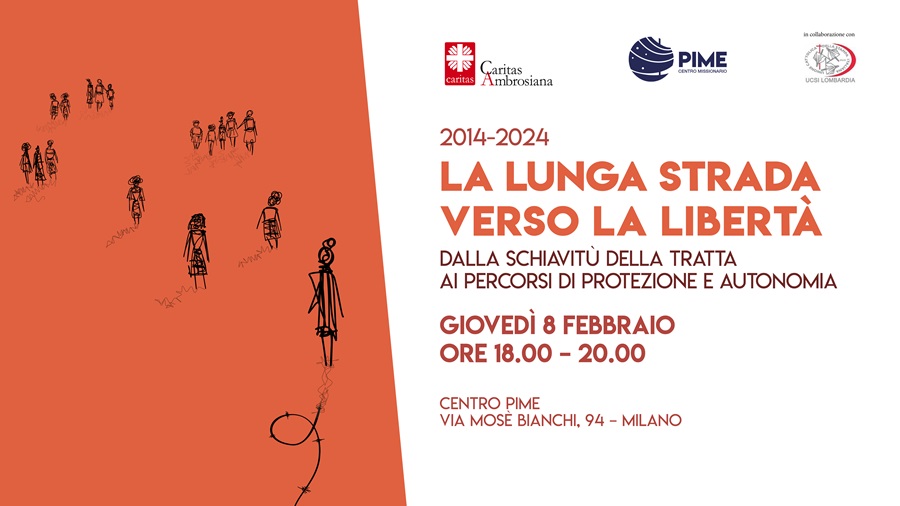The conference held on the World Anti-Trafficking Day on 8 February is also on video. An opportunity to delve deeper into the phenomenon in our country and to listen to the testimony of those who, like Blessing Okoedion, experienced slavery first hand
«Aren’t you ashamed or afraid? Do your parents know that your story has been told in a book? What if one day you have children?”. These are questions that Blessing Okoedion – a young Nigerian woman who survived trafficking and witnessed the fight against sexual slavery and (not only) – has heard asked many times. Often other women who, like her, have suffered deception and deprivation of freedom to be reduced to sexual slaves. Women who struggle to find the same courage to free themselves, report and testify, putting their face to it and putting themselves at risk. Telling the world that they have been victims of trafficking and sexual exploitation is difficult and dangerous. But the silence of too many – even those who should fight the phenomenon or the media themselves. continues to favor the exploitation and profits of criminal networks.
Social stigmatization, then, is another cage that prevents victims from fully regaining freedom and dignity. It is one of the themes that Blessing – now president of “Weavers of Hope”, an association that helps women who have ended up in the hell of trafficking – addressed during the conference entitled: “The road towards freedom – from slavery to trafficking to paths of protection and autonomy”. The initiative was promoted by the PIME Center of Milan and Caritas Ambrosiana, in collaboration with Ucsi Lombardia, on the occasion of the 10th Anti-Trafficking Day on 8 February.
In fact, ten years have passed since Pope Francis promoted this Day. And, since the beginning, various initiatives have also been promoted in Milan to delve deeper into an often “invisible” topic: «But it is only invisible to those who don’t want to see: from the institutions to the citizens up to the media that don’t talk about it», they underlined Anna Pozzi, journalist from Mondo e Missione, and Paolo Rappellino of the Association of Catholic Journalists. An indifference which, however, is not the norm: «Our missionaries – said Gianni Criveller, director of the PIME Center – are often engaged in contexts in which the “new slaves” are exploited or where many of those who end up come from in the networks of traffickers and exploiters in Italy. For this reason, in the countries of origin we operate with educational initiatives primarily for prevention; while here, in Italy, we promote awareness activities like this.”
The phenomenon which involves, according to data from the Global Index on slavery 2023, approximately 50 million people in the world: men, women and children. Women and children represent 70 percent of those exploited primarily for forced prostitution and forced labor. The number of minors, in particular, has tripled in the last 15 years. A profitable market in which mafias speculate and enrich themselves. “If we are not willing to change our obsession with money, we will suffocate ourselves.” Speaking is Sergio Nazzaro, journalist and author of the book “Nigerian mafia: the first investigation by the anti-trafficking squad”, who insists: «If we continue to build society only on money, women become another commodity. On the other hand, it is not right to criminalize poverty and ignore it.”
In fact, as stated by Professor Paola Degani, professor of Women’s Human Rights at the University of Padua, «many people – especially non-Europeans – risk finding themselves in very serious conditions of exploitation, who have left their countries to try to improve their living conditions, but who end up in the hands of criminal networks, which impose they owe them an enormous “debt” of which they are unaware.”
In recent years – as a consequence of the Covid-19 pandemic and the decrease in the landings of Nigerian men and women – the phenomenon has significantly changed. As the director of Caritas Ambrosiana Luciano Gualzetti also underlined: «Our operators and our services have observed a sort of “sinking” of the phenomenon of sexual exploitation from the street to theindoor et al web. This made the victims more “invisible” and unreachable. Working for the dignity and liberation of these new male and female slaves is increasingly difficult.”
Farsi Prossimo, a social cooperative of Caritas Ambrosiana, is an active part of the anti-trafficking project “Derive e Approdi”. A project that aims at the autonomy of survivors and social reintegration. Marta Faggioli, head of the rights and equal opportunities area of Farsi Prossimo, explains what the first contact actions of the street unit are and does so with verbs: «To go, to know, to stay, to support, to accompany, to allow and to fight. The operators, in the evening, at night or even during the day, travel the arteries of Milan and its surroundings to meet people forced into prostitution because they are victims of trafficking. They then reach the places of exploitation, meet especially women and transsexual people, establish relationships of trust and allow the victims to open up and seek support. And so they help them understand that they have rights.” A very important job: people who are victims of trafficking are starting to understand that what they have ended up in is not a dead end path and they can imagine a better life.
A glimpse of that better life is given by Luca Meola, photographer and author of the visual journey «Derive e landingi», which documents the “Derive e landing” project. A photographic journey that begins to tell the story of the night – with exploitation, prostitution, but also the work of the riders, the cold and the waiting – and then arrives at the day: the tranquility, the ability to choose one’s life, one’s home , the clothing to use… Small things that are part of a free life and fill the hope of a better future. (Faces of Francesca)
